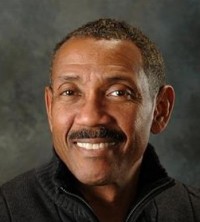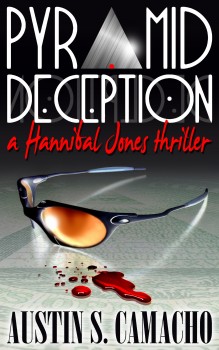The Pyramid Deception by Austin S. Camacho
In PYRAMID DECEPTION, the new release from author Austin S. Camacho, Private Eye Hannibal Jones takes on a case he can’t afford to lose. His girlfriend Cindy Santiago has been betrayed by a close friend and swindled out of all of her money. Hannibal closes in on Irene, his first credible lead, only to get framed for her murder. As he fights to clear his name and recover Cindy’s stolen funds, he stumbles down a rabbit hole of red herrings, double-crosses, and more killings. Hannibal’s quest for the truth puts him and Cindy in the crosshairs of a homicidal mastermind who’s not afraid of adding another name to his list of victims.
The Big Thrill caught up with Camacho this month to talk about the inspiration behind PYRAMID DECEPTION, his writing process, and what readers can look forward to next.
This was a complicated story peopled with characters of dubious motives. Did you flesh out a profile for each character or did they form organically as you wrote the story?
I had all the major characters clearly defined before I started writing. Of course, in the writing those people always evolve and grow a bit. That’s part of the fun of writing. But I knew them pretty well before I set them in motion.
The end was a big surprise, yet it answered the story question with great satisfaction. How did you construct the plot to do such a deft and tight job? Did you have the end in mind beforehand or did it appear as you finished the story?
I am a plotter, not a pantser in any way. So the first thing I know is the beginning of the story, and the very next thing established is the end. Then I kind of sit back and say, “well, that happened. Now how can I make it not obvious? How do I leave in all the necessary information and still lead my detective down the wrong path, so the reader will follow him?” I love building a corkscrew of a puzzle, and if I can leave the reader feeling I played fair but still fooled him, I’m one happy writer.
Tell us more about Hannibal Jones. How did you come up with him? How has his character developed through the series? Did you use any other similar protagonists to help mold Jones?
When I decided to write mystery novels I knew I wanted to take Phillip Marlowe and drag him into the 21st century. But when you take that guy and make one little change—he’s black—a hundred dominoes of character and personality fall. Hannibal Jones started as a throwback to the 1930s hero—a hard-headed investigator with a Galahad complex who was tied up in his own self-image (black suit, black gloves, and sunglasses were his “uniform” from the start.) Then he meets a woman who begins to soften his rough edges. So the series (this is number six) is a chronicle of the rising and advancing of one good man’s spirit.
This story had a lot of details about financial chicanery. What was the source of your research? Was this something you brought from your work or was this from your own private research?
Actually, it was all private research. Some (ahem) “Friends of the Family” have a history with confidence games and when I asked “how does a Ponzi scheme work?” I got quite the tutorial, including a lot of the history.
Your prose had me zipping through the pages and yet the story and the characters seemed fleshed out and convincing. What principles of craft do you keep in mind as you write?
Thanks for your kind words. I think any book called a thriller lives and dies by its pacing. I try hard to end each chapter with a legitimate cliffhanger, to pepper the story with small questions that keep you wanting to get to the answer, and to add the right amount of description: too little and the reader isn’t truly in the story, too much and it bogs down the pace. I’m not perfect but I keep trying.
What brought you to writing thrillers? What’s your writing background?
My training is journalism, but I write fiction because it’s what I love to read. After hundreds of mysteries and thrillers I started a book and realized by chapter three that I knew everything that was going to happen for the rest of the book. I had that moment when you say, “Heck, I can do better than this!” … and then of course you have to prove it to yourself. I knew what I wanted to read. I studied the work of my favorites in the genre, and then wrote a lot of crap on my way to learning this new craft.
What’s your writing process like? Do you set daily writing goals? Do you belong to a writing group? How involved are you in your local writing community?
I’m very involved in the local writing community. I speak at events, teach writing at a nearby community college and even run a genre writing conference—Creatures, Crimes & Creativity Con. I’ve been vice president of the Virginia Writers Club and President of the Maryland Writers Association. I love the company of writers and the way we can all help each other get better. I write every day but have no real daily goal except to make some sort of visible progress. I outline in detail (outlines could be fifteen or twenty pages), which is an iterative process, adding detail each pass until I know what happens in every scene of the book. When I get to the writing I’m IN the scene—seeing, hearing, feeling everything my POV character experiences. I’m simply reporting what happened.
What is your biggest challenge as an author? Any advice you want to share with newbie writers?
As an author my greatest challenge is to share my characters honestly with my readers. I have to show the heroes as real people, warts and all. And even though I want you to hate the villains I have to show you whatever positive traits they may have. I tell new writers you can write a good book if you have a good plot. But if you aspire to greatness, you have to get into the mind of every single character. You must remember that no one thinks they’re the bad guy, no one thinks they’re a minor character, and everyone has a good reason for everything they do,
Who are your favorite authors? What books are on your reading list?
I’ll break them up. Old school favorites are Raymond Chandler (whose prose feels like poetry), Elmore Leonard (best characters in the history of literature), and Ross McDonald (the ultimate master of plotting.) My favorites today include Dennis Lehane, Jeffrey Deaver, and John Gilstrap. These three guys are so prolific that they pretty much make up my reading list.
What’s next on your writing schedule?
I just turned in my next Stark & O’Brien adventure novel, The Lost Art Assignment, to my editor, and am working on the plot of the next Hannibal Jones novel, which will be much more of a twisty corkscrew mystery than PYRAMID DECEPTION is. I try hard to keep the cycle going.
*****
 Austin S. Camacho is the author of five novels in the Hannibal Jones Mystery Series (including The Troubleshooter, Blood and Bone, Collateral Damage, Damaged Goods and Russian Roulette) and four in the Stark and O’Brien adventure series (The Payback Assignment, The Orion Assignment, The Piranha Assignment, and The Ice Woman Assignment) and the detective novel Beyond Blue.
Austin S. Camacho is the author of five novels in the Hannibal Jones Mystery Series (including The Troubleshooter, Blood and Bone, Collateral Damage, Damaged Goods and Russian Roulette) and four in the Stark and O’Brien adventure series (The Payback Assignment, The Orion Assignment, The Piranha Assignment, and The Ice Woman Assignment) and the detective novel Beyond Blue.
To learn more about Austin, please visit his website.
- The Pyramid Deception by Austin S. Camacho - November 1, 2015
- The Horse Hide by J. R. Scott - September 30, 2015
- White Knuckle by Eric Red - May 31, 2015

